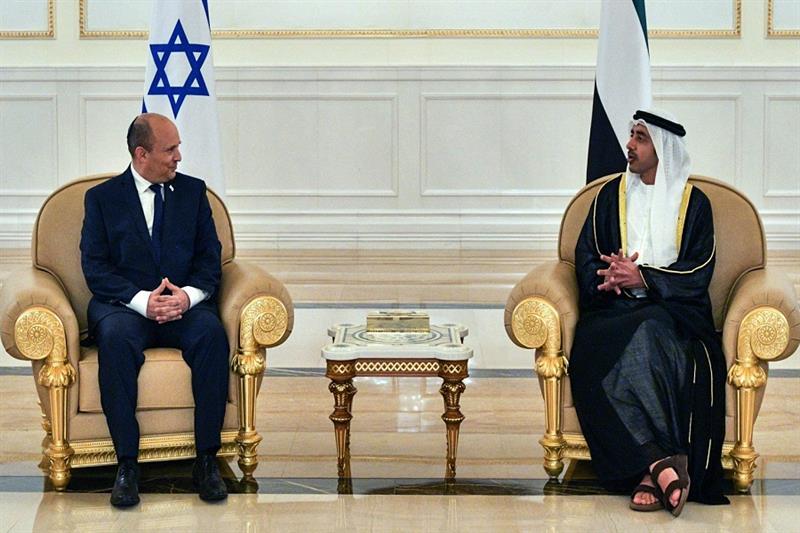
Emirati Foreign Minister Abdullah bin Zayed (R) receiving Israeli Prime Minister Naftali Bennett following his arrival in Abu Dhabi, on December 12, 2021. AFP
The rapprochement between Israel and several Arab states began in August 2020 with a UAE-Israel normalisation deal, and was followed by similar announcements between Israel and Bahrain, Morocco and Sudan.
'Historic'
In a surprise announcement on August 13, 2020, then US president Donald Trump announces Israel and the UAE have reached a "historic" agreement to normalise ties.
Previously, Egypt and Jordan were the only Arab states to have peace agreements under which they recognise Israel.
The UAE says that under the deal Israel agrees to "suspend" its annexation of parts of the occupied West Bank, although then Israeli premier Benjamin Netanyahu says it has simply been put off.
Palestinian president Mahmud Abbas calls the deal a "betrayal" of their cause, including their claim to Israeli-annexed east Jerusalem as capital of their future state.
First direct flight
On August 30, the UAE lifts a boycott of Israel.
The next day, an Israeli El Al aircraft makes the first commercial flight between the two countries, linking Tel Aviv and Abu Dhabi.
Jared Kushner, Trump's son-in-law heading an Israeli-US delegation on board, says Saudi Arabia allowed the plane to overfly its airspace.
'Stab in the back'
Trump announces 10 days later that Bahrain and Israel will also normalise ties.
On September 15, the two Gulf states, which have never been in conflict with Israel, sign the normalisation accords at the White House.
The Palestinians condemn the agreements as a "stab in the back".
On October 23, Sudan also decides to normalises ties, although the deal is not signed until January.
In exchange, Trump agrees to take it off a US sanctions blacklist of states which allegedly sponsor terrorism.
In December, Morocco likewise normalises relations with the Jewish state.
Diplomatic representation
In early 2021, Israel announces it will open a mission in the UAE, naming Eitan Naeh as its representative.
In March, the first Emirati ambassador to Israel, Mohamed al-Khaja, presents his credentials to then president Reuven Rivlin.
Investment and media
On March 11, the UAE announces the creation of a $10 billion investment fund in Israel focused on strategic sectors.
The international television channel i24News in June opens a permanent bureau in Dubai, a first for an Israel-based media outlet.
Embassies
In late June, Yair Lapid visits the UAE to open Israel's first embassy in the Gulf and also opens a consulate in Dubai, on the first official visit by an Israeli foreign minister since the normalisation accord.
The UAE opens an embassy in Tel Aviv on July 14, becoming only the third Arab country after Egypt and Jordan to have an embassy in Israel.
Joint exercises
In November, the UAE and Bahrain stage five days of joint naval exercises with Israel in the Red Sea.
First visit by Israeli PM
On December 12, Bennett arrives in Abu Dhabi for the first official visit of an Israeli prime minister to the Gulf state.
He is scheduled to meet the following day with Abu Dhabi Crown Prince Sheikh Mohammed bin Zayed Al-Nahyan.
Short link: